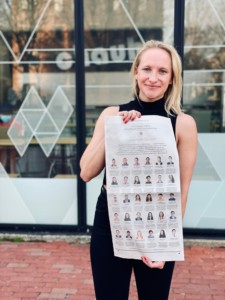
Harvard University Graduate School of Design DDes candidate Katarina Richter-Lunn (MDes ’21) has been awarded the 2022 Paul & Daisy Soros Fellowship for New Americans, a merit-based graduate school program for 30 immigrants and children of immigrants. Chosen from a competitive pool of over 1,800 applicants, Richter-Lunn was selected for her potential to make significant contributions through her research and work in the United States. She will join 10 other Harvard affiliated students who are being honored in 2022 by the Soros organization—all of whom receive up to $90,000 to support graduate studies.
The new class of Fellows have heritage in the following countries: Afghanistan, Cameroon, China, Democratic Republic of Congo, El Salvador, France, Germany, Grenada, India, Israel, Mexico, Myanmar, Nigeria, Pakistan, Poland, Romania, Russia, Syria, Taiwan, Uganda, and Vietnam.
“I love being at the intersection of architecture, psychology, and technology because it allows me to be creative while still using the power of science to look for adaptable, amiable, and most importantly, universally accessible solutions to address mental health.” Richter-Lunn said. “Not only is the topic of mental health very close to my heart but doing what I do for a living makes me truly feel that I can make a change in my field, and contribute to the vision of what the future of design will be.”
After holding positions at Arup, Gehry Partners, IwamottoScott, and Snøhetta, Richter-Lunn returned to school and received her MDes from GSD in 2021. She is now enrolled in GSD’s DDes Program, where her primary research lies at the intersection of design, psychology, and neuroscience to address mental well-being through the built environment. As part of this work, she explores perception through the lens of material development, computational design, affective computing, and robotics. Additionally, Richter-Lunn seeks to envision how architecture, design, and our latest technological tools can embody spatial forms of therapy to provide more empathetic, seamless, and accessible design solutions to emotional disorders.